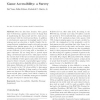Free Online Productivity Tools
i2Speak
i2Symbol
i2OCR
iTex2Img
iWeb2Print
iWeb2Shot
i2Type
iPdf2Split
iPdf2Merge
i2Bopomofo
i2Arabic
i2Style
i2Image
i2PDF
iLatex2Rtf
Sci2ools
184
click to vote
UAIS
2011
2011
Game accessibility: a survey
Over the last three decades, video games have evolved from a pastime into a force of change that is transforming the way people perceive, learn about, and interact with the world around them. In addition to entertainment, games are increasingly used for other purposes such as education or health. Despite this increased interest, a significant number of people encounter barriers when playing games, due to a disability. Accessibility problems may include: (1) not being able to receive feedback; (2) not being able to determine ingame responses; (3) not being able to provide input using conventional input devices. This paper surveys the current state-of-the-art in research and practice in the accessibility of video games, and points out relevant areas for future research. A generalized game interaction model shows how a disability affects ones ability to play games. Estimates are provided on the total number of people in the U.S. whose ability to play games is affected by a disability. ...
Accessibility | Disability | UAIS 2011 | Video Games |
Related Content
| Added | 15 May 2011 |
| Updated | 15 May 2011 |
| Type | Journal |
| Year | 2011 |
| Where | UAIS |
| Authors | Bei Yuan, Eelke Folmer, Frederick C. Harris |
Comments (0)

